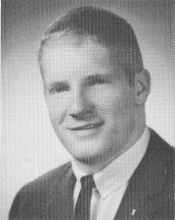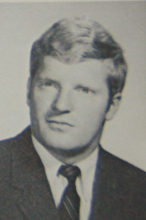

We do not have an official obituary for Michael (Strats) stratton, but here is a link to a great story about him in the April 1986 Dartmouth Alumni Magazine (DAM).
Here is a writeup contributed by classmates:
There has been much written and said about Mike and the common denominator is: he was one helluva guy. Being larger than life, outdoors, and active was a good description of Mike but did not define him.
Mike Stratton had a magnetic personality, even at a young age. Growing up in Denver. Jay Glaser remembered his first encounter with Mike as a nine-year-old playing baseball on a team that had no real prospects for success…until Mike appeared. At the start of the new season, Jay recalled a new kid showed up, red haired and covered with freckles. He wasn’t a big kid…yet, but he was solid and supple; even more than that, he was coachable. He seemed to have a rare purity and simplicity of heart. If the coach told Mike something, he just did it. He didn’t analyze, think of a better way, agree or disagree. He just did it.
It didn’t take long to see the impact Mike would have on the team. As a pitcher during batting practice, he threw balls Jay couldn’t even see. And when at bat, he could hit the ball a mile. Mike led the team into the playoffs that year, beating teams that had won handily in previous years. In the championship game, Strats nearly threw a no-hitter, and got the only hits for his team. His teammates mobbed him, patting and hugging him to make sure he was real, just like the rest of them. With that contact, Jay said they all gained the understanding that each of them was made of the stuff of legends. Mike seemed bigger than life to the team during that season and was a hero of mythic proportions. Jay said he didn’t know what happened to the days of heroes, but to every kid on that team, and to Jay even today, Mike was a hero.
Even before his appearance at Dartmouth, Mike encountered what was to become his lifelong love and commitment. A high school football coach recommended he apply for a scholarship to Colorado Outward Bound. He was accepted to that program and reveled in the experience of helping young people achieve difficult goals and find self-confidence. His life’s course was set.
One of the advisers of the Colorado program was a Dartmouth `49 who was involved with the admissions office and the Ledyard Canoe program. Mike couldn’t decide between Princeton and Dartmouth, but he liked the gray striped baseball uniforms in a B&W photo he found in a Dartmouth Alumni magazine. By the time Mike learned those were the Princeton uniforms, he was already a member of our Class.
A lot of us knew Mike at Dartmouth, even talking with him fairly often. Many were never sure if Mike knew who they were, but it didn’t matter. Once you met Mike, you liked him and wanted to be around him. By that time, he had become the six foot four, 250-pounder we all remember. Mike had an appetite. During Freshman Week, he single-handedly forced the Green Lantern to cancel its “All You Can Eat” policy.
During his freshman year Dean Dey asked Mike and several other Outward Bound grads to attend a meeting at the Tucker Foundation. There they were asked to establish a winter outdoor education program for the local high school students. Called “A Reason for Freezin,” it led to the opening of the Dartmouth Outward Bound Center in 1968.
In his senior year he increased his commitment to helping youth gain confidence and appreciation for the natural world around them. Upon graduation he immediately went to work for Dartmouth and Hurricane Island (Maine) Outward Bound schools. He made an effort to see Outward Bound programs around the world and learned about programs adapted for delinquents, substance-abusers, and handicapped kids. Young people in all the programs he visited were drawn to him and felt they could depend on Mike.
In 1971, while at Hurricane Island, the headmaster of the Carroll School met him and asked Mike to start a confidence building outdoor program for dyslexic students. Despite not being certain what dyslexia was, he took the job and stayed there to the end. His presence was immediately felt with kids becoming involved in all the outdoor activities he was establishing. The Bounders program survives to this day and Mike’s spirit is a strong part of the Carroll School.
His work at the school was noticed by the outside world as well, with honors such as the Boston Jaycees in 1982 naming him one of the area’s outstanding young leaders; in 1984 Esquire magazine named him one of “the best of the new generation – 40 men and women under 40 who are changing America.” The Association for Experimental Education still has a Practitioner’s Award and grant named in Mike’s honor.
With his Bounders program well established, Strats moved from the cabin on the Carroll School grounds to a house in Lincoln, Mass where he and Nancy raised their children, Cort Danger, Kelsey, and Lance. Although Lance was too young to know his Dad, Nancy says that he is the spitting image of his father. Perhaps it’s the outdoorsman gene that was passed along; Lance is a fishing guide, outfitter and ski patroller in Bozeman.
During the summer of 1985 Mike began experiencing severe headaches and suffered two seizures. Hospital tests revealed he had inoperable brain cancer. Mike continued on with his work as best he could with the attitude that he was not a cancer victim, but a cancer patient. Always liking aphorisms, he was ready with one for his condition: “I CANCERVIVE!”
Unfortunately, the cancer overcame Mike’s determination and strength, taking his life in November 1987.
Just like the Denver baseball team he led to glory in his youth, people around the world – the kids he worked with, his family, his friends, his college classmates – all felt he was a hero of mythic proportions, and always will be for us who had the benefit of working with Mike or knowing him.
These classmate obituary pages are our attempt to honor and remember classmates who have passed away. We have attempted to find and share a public obituary and have added some photos and classmate comments. In some cases we have not been able to find an obituary. If you know of an obituary where one is missing, please let us know. If you have a remembrance you think is important to share, please let us know. Comments can be submitted through the Contact Us form on this web site.